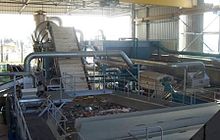- Materials recovery facility
-
A materials recovery facility or materials reclamation facility or materials recycling facility (MRF - pronounced "murf") is a specialized plant that receives, separates and prepares recyclable materials for marketing to end-user manufacturers. Generally, there are two different types: clean and dirty MRFs.
Contents
Clean MRF
A clean MRF accepts recyclable commingled materials that have already been separated at the source from municipal solid waste generated by either residential or commercial sources. There are a variety of clean MRFs. The most common are single stream where all recyclable material is mixed, or dual stream MRFs, where source-separated recyclables are delivered in a mixed container stream (typically glass, ferrous metal, aluminum and other non-ferrous metals, PET [No.1] and HDPE [No.2] plastics) and a mixed paper stream, (including OCC, ONP, OMG, Office packs, junk mail, etc). Material is sorted to specifications, then baled, shredded, crushed, compacted, or otherwise prepared for shipment to market.
Dirty MRF
A dirty MRF accepts a mixed solid waste stream and then proceeds to separate out designated recyclable materials through a combination of manual and mechanical sorting. The sorted recyclable materials may undergo further processing required to meet technical specifications established by end-markets while the balance of the mixed waste stream is sent to a disposal facility such as a landfill.
The percentage of residuals (unrecoverable recyclable or non-program materials) from a properly operated clean MRF supported by an effective public outreach and education program should not exceed 10% by weight of the total delivered stream and in many cases it can be significantly below 5%.[citation needed] A dirty MRF recovers between 5% and 45% of the incoming material as recyclables,[citation needed] then the remainder is landfilled or otherwise disposed. A dirty MRF can be capable of higher recovery rates than a clean MRF, since it ensures that 100% of the waste stream is subjected to the sorting process, and can target a greater number of materials for recovery than can usually be accommodated by sorting at the source. However, the dirty MRF process is necessarily labor-intensive, and a facility that accepts mixed solid waste is usually more challenging and more expensive to site.
Wet MRF
New mechanical biological treatment technologies are now beginning to utilise wet MRFs.[1] This combines a dirty MRF with water, which acts to density separate and clean the output streams. It also hydrocrushes and dissolves biodegradable organics in solution to make them suitable for anaerobic digestion.
History
In the United States, modern MRF's began in the 1970s. Resource Recovery Systems, Inc. operated by Peter Karter was one of "the first materials recovery facilities (MRF) in the US." [2]
See also
- Curbside collection
- List of waste treatment technologies
- Mechanical biological treatment
References
- ^ ArrowBio Process Finstein, M. S., Zadik, Y., Marshall, A. T. & Brody, D. (2004) The ArrowBio Process for Mixed Municipal Solid Waste – Responses to “Requests for Information”, Proceedings for Biodegradable and Residual Waste Management, Proceedings. (Eds. E. K. Papadimitriou & E. I. Stentiford), Technology and Service Providers Forum, p. 407-413
- ^ Mastermind of the MRF Logsdon, Gene. BioCycle. Emmaus: Apr 1993. Vol. 34, Iss. 4; pg. 49, ff. [1]
External links
- Diagram of MRF process
- Typical commercial recycling plant with information about recycling methods
- "Coming soon! van der Linde's amazing recycling machine"
- Materials Recovery Facility: Description of the MRF in the Context of its role as one of the component parts of Mechanical Biological Treatment (MBT) processes
Topics related to waste management Anaerobic digestion · Composting · Downcycling · Eco-industrial park · Incineration · Landfill · Materials recovery facility · Mechanical biological treatment · PullApart · Radioactive waste · High-level radioactive waste management · Recycling · Regift · Reuse · Septic tank · Sewerage · Sewage regulation and administration · Upcycling · Waste · Waste collection · Waste hierarchy · Waste legislation · Waste management · Waste management concepts · Waste sorting · Waste treatmentCategories:- Environmental engineering
- Recycling
- Waste treatment technology
Wikimedia Foundation. 2010.



